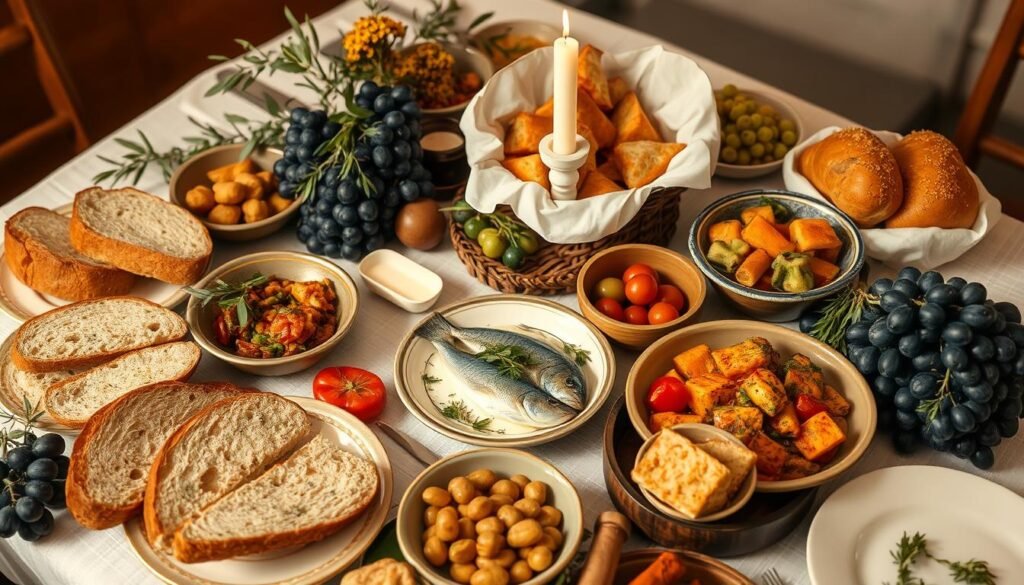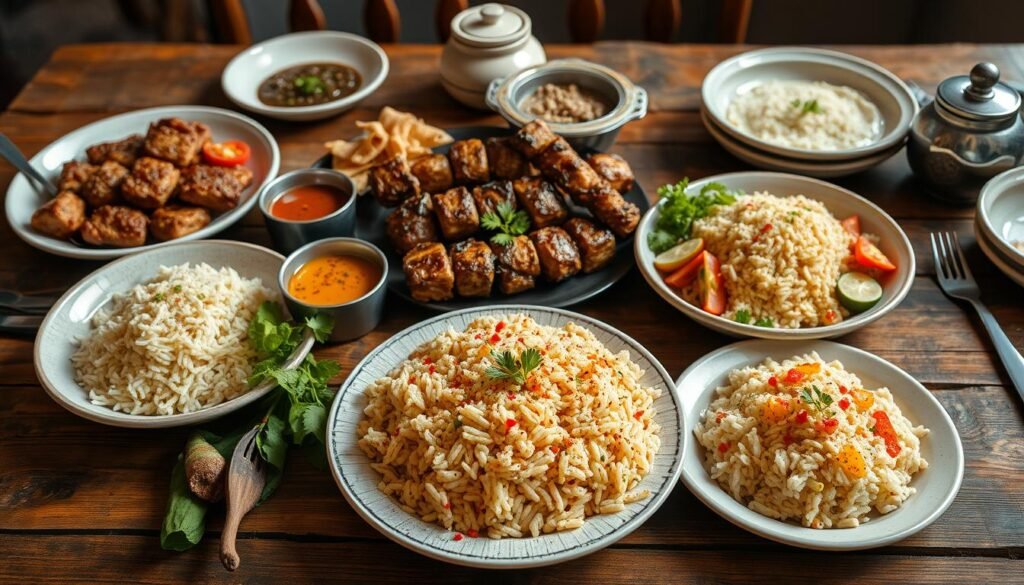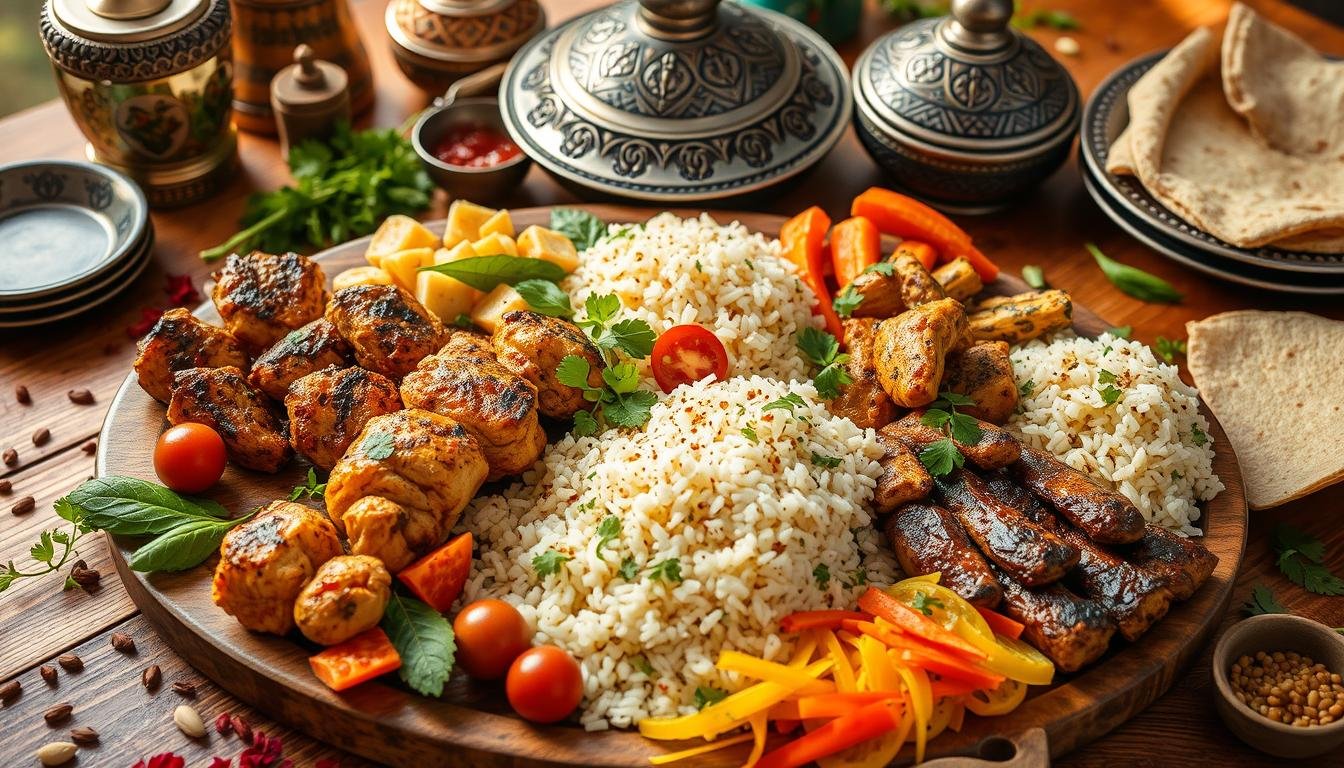Can Christians eat halal food without giving up their faith? This question makes us think about how dietary laws and religious beliefs mix. It also makes us question what Christians can and cannot eat. We will look into the details of halal rules, the history of Christian diets, and the ethics of eating halal. Let’s start this journey to see if halal food fits with Christian beliefs.
Understanding the Concept of Halal
Halal is key in the diets of Muslims worldwide. It’s important to know what halal food is under Islamic dietary laws. This includes what foods are okay to eat, how they should be made, and how they should be prepared.
The Definition of Halal
Halal means “permissible” in Arabic. In food terms, it means foods allowed for Muslims by Islamic dietary laws. This means animals must be slaughtered correctly, their blood must be drained, and sharp tools must be used. Some animals, like carnivorous ones and birds of prey, are not allowed.
Halal vs. Haram: What’s Forbidden?
Knowing the difference between halal and haram is crucial for respecting Islamic dietary rules. Haram means “forbidden” and includes things like pork, blood, and carrion. Animals not killed the right way are also haram. The rules between halal and haram are based on religious texts like the Qur’an. They help followers stick to their faith in their food choices.
The Historical Context in Christianity
Looking into early Christianity helps us understand today’s debates on food and diet. Paul’s views on eating food offered to idols show how faith and community mix in the Corinthian Church. His teachings still shape how Christians think about food today.
Paul’s Teachings on Food and Idols
Paul wrote about eating food offered to idols in his letters. He said an idol has no real power, so the food is not bad. But, he urged believers to think about how their actions affect others in the community.
Paul suggested being careful. He said eating certain foods should show love and care for those who are easily influenced. This shows how important it is to stay united and understanding in the Christian community.
Lessons from the Corinthian Church
Paul’s teachings in Corinth teach us important lessons today. The church struggled with how to handle food choices. Paul said spiritual freedom doesn’t mean we can do whatever we want.
He said we should avoid certain foods if it might make others doubt. This keeps the community strong and respectful. These ideas apply to many parts of Christian life, including dietary practices in different cultures.

Dietary Laws in the Bible
The Bible gives us deep insights into dietary laws that guided its followers. These laws help us see how ancient guidelines still affect today’s food debates. By looking into their origins, we can see their lasting impact across cultures.
Scriptural References on Eating Practices
In the Old Testament, especially in Leviticus 11, we find detailed rules about what to eat. These rules told the Israelites which animals were clean or unclean. This shaped their eating habits and brought them closer as a community.
The Impact of Cultural Contexts on Dietary Choices
Early Christians’ food choices were also influenced by culture. For example, the Apostle Paul wrote about how different groups ate. He noted the differences between Jewish and Gentile believers’ food habits. This shows how cultural settings could change how people understood and applied biblical teachings, leading to varied eating habits in the early church.
Can Christians Eat Halal?
Many Christians are curious about eating halal, wondering if it fits with their beliefs. Most agree that Christians can eat halal food because it’s okay under most Christian diets. Halal food rules come from Islamic teachings. They are different from Christian food rules but don’t stop Christians from eating them.
It’s important to think about the situation when eating halal food, especially with Muslims or those who believe in halal. Accepting different food beliefs helps us understand and connect with each other better. Eating halal can also help us bond with people from different cultures and backgrounds.

Christian Freedom and Dietary Choices
Christians have a deep sense of freedom when it comes to what they eat. This freedom helps them make choices that match their beliefs and faith. They know they have the right to choose, but they also think about how their choices affect others.
The Principle of Liberty in Christ
Christian liberty lets people make their own food choices. The Bible, in Romans 14, tells believers to think carefully about their freedom. Eating halal foods is one way to use this freedom, but it’s important to think about how it might affect others.
Being aware of how our choices impact others helps us live together better in our faith communities.
Balancing Freedom and Love for Others
When making food choices, Christians should put love for others first. If eating halal food makes others uncomfortable, it might be better to choose differently. This shows true Christian love by thinking about how our actions affect others.
It helps build a stronger, more caring community. 1 Corinthians 8:9 teaches us to balance our freedom with the need to protect others’ faith.
Halal Food Preparation and its Implications
Halal food preparation follows strict guidelines based on Islamic principles. At the core, the slaughtering method is crucial. It affects both Muslims and those new to Islamic practices.
The Significance of the Slaughtering Process
The process of making meat halal starts with a special ritual slaughter. This method is detailed and traditional. It ensures the animal is treated kindly and Islamic laws are followed, including saying Allah’s name before the slaughter.
This ritual is key. It clearly separates halal from non-halal meat. It also builds trust in halal food sources.
Prayers Said During Halal Preparation
Prayers are said during halal food preparation. The Bismillah, meaning “in the name of Allah,” is one of them. It reminds us of the spiritual importance of the slaughter.
Some may also say the Shahada, showing their commitment to Islamic beliefs while preparing food. These prayers show deep respect. They might be hard for some Christians to understand, as they seem to support the Islamic faith.

Considerations for Eating Halal
Thinking about what to eat can be tricky, especially when it comes to halal food. Eating halal means different things in different cultures and to different people. It’s important to know when to eat halal foods and how they fit into social situations.
When to Refrain from Eating Halal Foods
There are times when you might choose not to eat halal food. This could be to avoid any confusion about your beliefs, especially if others might think you’re showing support for Islamic practices. Being careful with what you eat helps keep things clear and respectful in different cultures.
How to Approach Meals with Muslim Friends
When eating with Muslim friends, it’s key to be sensitive to their culture and follow Islamic dining rules. Knowing about halal food can make things easier and build trust. Changing your eating habits to fit in with your friends can strengthen your bond, while still respecting your own beliefs. Talking openly about what you can and can’t eat can make sharing meals smoother.
The Role of Conscience in Dietary Decisions
In the Christian community, choosing what to eat makes us think deeply about our conscience. It’s important to know what guides these choices for better relationships among believers. Our beliefs about food come from scripture, tradition, and culture, all affecting our conscience.
Understanding Personal Conscience and Community Contexts
Our conscience helps guide our food choices, making sure they match our faith. Christians should look at their beliefs and how they fit with their community’s views. This helps keep everyone united and respectful, even in diverse groups.
Thinking carefully about what we eat can lead to deeper talks, understanding, and connections with people from different cultures.
Christian Engagement in Muslim Cultures
Engaging with Muslim cultures gives Christians a chance to make new friends and share their beliefs. Sharing meals across cultures helps build understanding and respect. It’s a great way to connect with others and make friends.
Examples of Cross-Cultural Dining
Community events are a great way for Christians to share meals with Muslims. These events bring together food that honors both Christian and Muslim traditions. This shows respect and helps build strong friendships based on understanding.
How Dietary Choices Affect Evangelism
What we eat can really help spread the word about our faith. By learning about halal food in Muslim cultures, Christians can talk about their beliefs with care. Respecting food choices opens up conversations that are welcoming and inclusive.
Halal Food in the United States
The demand for halal food in the United States has grown a lot lately. This growth is because more people want food that follows Islamic dietary laws. With more cultures mixing in American society, we now see halal options in stores, restaurants, and festivals.
The Availability and Popularity of Halal Foods
Now, many cities have a strong halal food market. This makes it easy for people to find different meal choices. Big chains and small eateries are adding halal food, serving Muslims and those interested in new tastes.
This trend shows how culture and community come together. It also shows how the market is responding to the need for more food choices. This makes American food more diverse and interesting.
More people know about halal food, which has opened up new dining spots. This lets people try new things while respecting different beliefs. It’s a sign of a positive change towards accepting more cultures.
This change highlights the value of having food options that fit different cultures. It helps bring communities together in the United States.
Respecting Others’ Beliefs Through Food Choices
In today’s diverse world, how we choose what to eat can make a big difference. It’s key to respect food beliefs like halal to bring people together. By understanding the importance of halal in the Muslim community, we can all work towards being more sensitive to each other’s cultures. This helps create a place where everyone feels respected.
It can be tricky to mix our own beliefs with others’ traditions. When talking to friends or family who eat halal, we must be thoughtful. Sharing our beliefs openly can lead to more acceptance and stronger bonds. This way, we can build connections that respect everyone’s values.
At the end of the day, being respectful in our food choices helps us all get along better. By seeing the value in halal and other dietary rules, we can build relationships that celebrate our differences. This leads to meaningful interactions based on respect and understanding.
FAQ
Can Christians eat halal food?
Yes, Christians can eat halal food as it is generally okay. But, they should think about their choices, especially when eating with others or with Muslims.
What is the definition of halal?
Halal means “permissible” in Arabic. It refers to foods and practices allowed in Islam. Halal meat must be prepared in a certain way, including draining blood and avoiding certain animals.
What does haram mean?
Haram means “forbidden” in Arabic. It includes foods like pork, blood, and animals not slaughtered in a special way. Knowing the difference between halal and haram is key for dietary choices.
What are Paul’s teachings regarding food and dietary choices?
Paul says in 1 Corinthians 8 that Christians can eat meat even if it was offered to idols. He stresses the importance of love and considering others in what we eat.
How do cultural contexts impact dietary choices?
Culture affects what we eat. Paul’s advice changed for different groups, showing the need to respect local customs while staying true to our beliefs.
What is the significance of the slaughtering process in halal food?
The way halal meat is slaughtered is important, following Islamic laws. This can be tricky for Christians to understand when thinking about eating halal.
Are there specific occasions when Christians should refrain from eating halal?
Yes, Christians might not eat halal in certain situations. This could be if it might support Islamic practices or cause confusion about their beliefs.
How should Christians engage in meals with Muslim friends?
When eating with Muslims, Christians should be respectful and sensitive to their culture. They might adjust their food choices to build good relationships without giving up their beliefs.
What role does personal conscience play in dietary decisions?
Our personal beliefs are key in deciding what to eat. Christians should think about their own beliefs and the views of their community when making food choices.
How can Christians engage with Muslim cultures through food?
Sharing meals with Muslims can help Christians and Muslims understand each other better. Eating in a way that respects both traditions can build bridges between the two groups.
What is the current availability of halal foods in the United States?
Halal food is getting easier to find in the United States. It’s now common in grocery stores, restaurants, and food festivals, showing more people are learning about different cultures.
Why is it important to respect others’ dietary beliefs?
Respecting others’ food choices helps us understand and work together with different communities. It allows for respectful talks and interactions over food.

Rockin’ the faith, one verse at a time!
Growing up, the Bible’s stories deeply impacted me. Now, with over 15 years of preaching experience, I blend timeless teachings with modern technology, making them relevant for today’s world.
Bible Hub Verse is my platform to share historical insights and thought-provoking articles, exploring both familiar and uncommon Christian topics. My passion is building a welcoming online space for everyone to learn, grow in their faith, and discover the Bible’s enduring message.
Join the journey!
God bless you.









